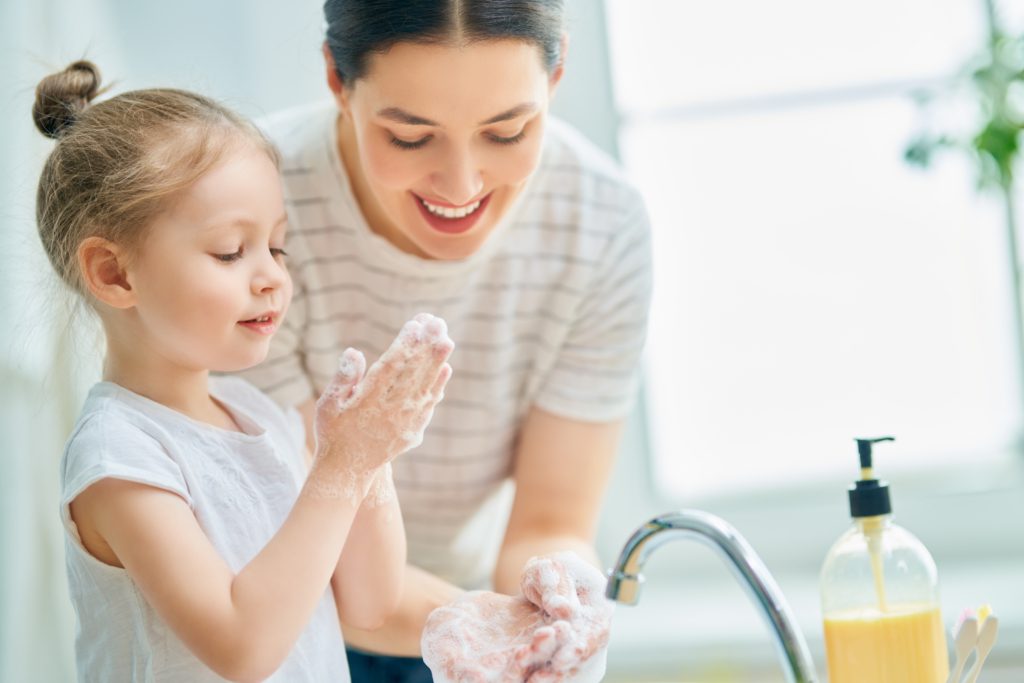As the SARS-Cov-2 pandemic seems to be winding down in the United States, we can look back and realize we learned a lot about keeping our kids healthy during spikes in respiratory viruses – novel viruses along with other common respiratory viruses (influenza, respiratory syncytial virus, etc.) This blog will share the best ways to keep your child healthy with Covid.
What is the Best Way to Protect Your Child Against Covid?
One of the most important things you can do for your child is make sure their immunizations are up to date. This includes a Covid vaccine if your child is at least five years old. To learn more about the mRNA vaccine, check out our blog, How Do mRNA Vaccines Work?. Influenza shots also protect children six months and older.
Even if your child is too young to be protected by vaccination, making sure those around them are vaccinated provides a protective bubble that has been shown to be very effective in limiting the severity of illness in young kids and babies. Your young child’s “bubble” should include all family members old enough to be vaccinated and others who spend significant face-to-face time with your child.
Simple Measures To Keep Your Child Healthy During Covid
During the SARS-CoV 2 pandemic, we also realized how effective and simple measures could be in preventing common and sometimes very serious childhood illnesses. During the winter of 2020-2021, hospitalization rates for children with either influenza or RSV (Respiratory syncytial virus) plummeted to near zero. While there were a variety of factors in this drop, some of them are simple and easy to sustain when needed.
Frequent hand washing and wearing a mask when feeling ill help decrease the spread of viruses to others.
And less virus in our community means fewer people get sick. These measures also help prevent your child from becoming sick. Although all kids are going to get respiratory viruses, this might be useful when wanting to avoid illness in your child – like the week before a big trip to Disney.
Avoiding crowded indoor spaces when possible during peak respiratory season will also decrease the number of illnesses your child gets. Plan trips to indoor play places, movies, concerts, etc. – outside the peak respiratory season (usually late November to March) or maybe avoid them the one to two weeks before big events. Of course, kids will get respiratory viruses despite our attempts to avoid them – it’s part of growing up.
Trying to maintain good overall health will help make these illnesses milder and shorter.
This means encouraging a healthy diet and good sleep habits; keeping kids active and outside on a daily basis. Check out our resource page, Healthy Bodies for Life, for healthy recipes and tips.
Although there are over-the-counter products marketed to prevent or shorten the during of respiratory viruses, none of them are recommended for healthy children.
Pay attention to any mental health problems and address issues that arise. If your child has chronic medical conditions such as asthma or diabetes, make sure they maintain good control of their condition with recommended medications and/or monitoring. Avoid exposing your child to smoke. Smoke exposure from cigarettes, vaping, etc., can prolong or worsen respiratory symptoms and increase the chance your child will need medical care during their illness. A child with a healthy mind and body, and lungs will be better able to handle the illnesses they face.
So whether we face a new variant of Coronavirus or the many respiratory viruses we know, parents have a variety of tools to keep kids healthy. This includes maintaining overall good health, staying up to date on vaccinations, and using masking and social distancing when desired.
The Youth Clinic providers are Northern Colorado’s specialists in the treatment of infants, children, and young adults. If you are a Northern Colorado local, check out our Pediatric Services and set up a Well Care appointment for your child today!
About The Author
Beth Ballard, MD
Dr. Beth Ballard joined The Youth Clinic in 2000 after completing medical school and her pediatric residency training at the University of Colorado Health Sciences Center in Denver. Dr. Ballard is Board Certified and a fellow of the American Academy of Pediatrics.

